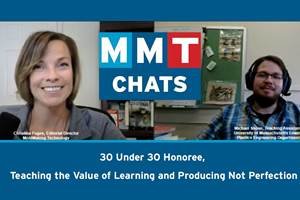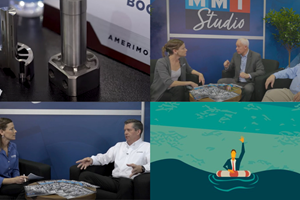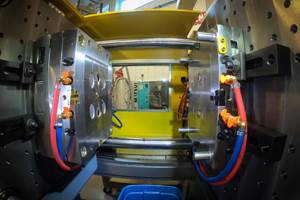Save Time, Money and Labor by Leaving Your Insert Work to an Expert
Outsourcing: As moldmakers look to the beginning of a new century and the new challenges that they face, outsourcing their extensive insert work is a smart business decision.
As moldmakers look to the beginning of a new century and the new challenges that they faceproducing quality molds in about half the time they used to - outsourcing their extensive insert work is a smart business decision.
Keeping one step ahead of the competition is paramount to any moldmaker's success. According to Brad Fox, the president of St. Paul, MN-based Rapid Tooling, outsourcing insert work affords a competitive advantage. "For most moldmakers, delivery time is the key deciding factor for increasing their business," he comments. "Depending on part geometry, the machining of electrodes and the subsequent burning of inserts is time-consuming - restricting the amount of tools a shop can take on at one time.
"Most shops are staffed at a certain level, which means that (with traditional insert making) a very specific threshold of tool-making limits their growth," Fox continues. "They either add more equipment, add more people, add more of both or buy inserts from companies that specialize in this type of insert work."
By eliminating this more labor- and time-intensive step of the moldmaking process, a shop can concentrate more on assembling the mold instead of producing the insert. "If a shop can supplement its insert-making by outsourcing them, it can push the overall revenues - take on more tooling projects without adding a lot more equipment and/or people," Fox states.
This strategy has worked for Fresno, CA-based Wade Rain, an irrigation component manufacturer. According to toolroom supervisor Steven Brunnengraeber, this small company can have three or four major jobs going at once. "We can make our molds quicker, we can respond quicker, we don't have to get on somebody else's schedule and wait six months," he comments. "You need flexibility and speed in this industry to get a design into a working part right away - it just works real well for us."
Russ Blackledge, operations manager for InterPro (Deep River, CT), an RTD moldmaker, couldn't agree more. "If one of our customers needs something that is not a long run, they need fewer than a thousand parts or up to a few thousand parts, this is a good alternative," he states.
Looking for Mr. Right
According to Fox, the mold insert provider should know a great deal about the moldmaking process - from start to finish. "Even though they may not be designing or building the entire mold, they do need to have toolmaking knowledge so that any potential problems can be addressed as quickly as possible," he points out.
Current technology is another key issue. "The insert provider should be utilizing a technology that produces reliable, accurate inserts that perform close to how traditional inserts would run," Fox states. "The rapid tooling industry is fraught with a number of technologies that claim fantastic results. The insert technology must be stable and reliable so that the toolmaker doesn't add 'risk' to the project. Toolmakers just cannot afford to utilize a rapid insert technology that is still 'R&D' oriented."
Locating an outsourcing provider that can turn out quality work and still allow the moldmaker to turn a profit also is important. According to Fox, the moldmaker buying inserts should still be able to make "decent margins."
Fast delivery completes the equation, Fox says. "Delivery of rapid inserts should be just that - rapid," he comments. "If it takes longer than a week and a half, it's too slow."
Establishing a Rapport
Fox stresses that a moldmaker must first determine which types of inserts he needs. "Fully formed inserts are a fairly new concept," he explains. "Some companies say they provide inserts, but these are simply 'blocks' that fit into their mold base. These 'inserts' must then be machined. Others provide the completely formed inserts." He recommends scanning trade publications for insert providers and also looking to organizations involved with rapid prototyping/rapid tooling.
"A company should meet with an insert provider, if possible," Fox suggests. "The moldmaker should send someone from their company who is responsible for purchasing tools - along with a tool designer. We have the best luck when a company sends someone who has a 'mission' to find faster tooling solutions, that is, someone who is innovative and willing to work out the details."
According to Fox, these details should include information that is "somewhat comprehensive on what they expect from the rapid inserts - when they get the insert back, what do they need to do to finish it off to the point where it's ready to be assembled into the fully working mold." Some insert providers share information on how to weld on the rapid insert, EDM the parting line/shut-offs, machine the insert, harden the insert, texture the insert and plate the insert.
It should take about two projects to establish a good working relationship with a "rapid insert" vendor, Fox maintains. "Usually, some things are learned on the first job that streamline the second and subsequent jobs," he states. "Things always move faster with customers who do their own in-house tool assembly - a little longer if there's a third party involved, for example, a secondary tooling shop where the inserts would be shipped to."
Another alternative to building this rapport is via the Internet. "Virtually all of our business is transacted over the Internet," Fox says. "The relationship usually begins with an exchange of information. Many find our website and get information about our rapid inserts. We also have a place on the site where customers can download an 'Insert Prep Guide,' which explains how to use the inserts. Next, we see a 'trial' project of simple geometry so that customer personnel can get a level of comfort with our rapid inserts. After this, we work carefully with them, examining each potential project and discussing the pros/cons of using rapid inserts. Sometimes the part isn't the right fit and we quickly communicate this back to the customer."
No matter how you choose to begin a relationship with an insert provider, Fox feels the results speak for themselves. "The moldmakers can then become expert 'tool assemblers' - enabling them to push revenues past what their existing equipment and manpower would let them otherwise do."
Interpro's Blackledge can attest to that. "Things are changing in this industry," he comments. "More moldmakers are going to be doing this in the future." And Brunnengraeber of Wade Rain sums it up quite nicely, "Outsourcers can do it quicker, a lot more accurately and a lot cheaper than we can," he emphasizes.
For more information please contact Brad Fox of Rapid Tooling (St. Paul, MN) at (800) 328-1323 or visit the web at www.rapid-design.com.
Related Content
ICYMI, MMT Chats: 30 Under 30 Honoree, Plastics Engineering TA Teaches Value of Learning and Producing Not Perfection
MoldMaking Technology Editorial Director Christina Fuges brings on UMass Lowell Plastics Engineering Teaching Assistant Michael Shone as a guest for this MMT Chat to discuss moldmaking through the lens of academia. This episode is brought to you by ISCAR with New Ideas for Machining Intelligently.
Read MoreFrom Injection Mold Venting to Runnerless Micro Molds: MMT's Top-Viewed June Content
The MoldMaking Technology team has compiled a list of the top-viewed June content based on analytics. This month, we covered an array of topics including injection mold venting, business strategies and runnerless micro molds. Take a look at what you might have missed!
Read MoreHands-on Workshop Teaches Mold Maintenance Process
Intensive workshop teaches the process of mold maintenance to help put an end to the firefighting culture of many toolrooms.
Read MorePredictive Manufacturing Moves Mold Builder into Advanced Medical Component Manufacturing
From a hot rod hobby, medical molds and shop performance to technology extremes, key relationships and a growth strategy, it’s obvious details matter at Eden Tool.
Read MoreRead Next
How to Use Continuing Education to Remain Competitive in Moldmaking
Continued training helps moldmakers make tooling decisions and properly use the latest cutting tool to efficiently machine high-quality molds.
Read MoreReasons to Use Fiber Lasers for Mold Cleaning
Fiber lasers offer a simplicity, speed, control and portability, minimizing mold cleaning risks.
Read MoreHow to Use Strategic Planning Tools, Data to Manage the Human Side of Business
Q&A with Marion Wells, MMT EAB member and founder of Human Asset Management.
Read More













.png;maxWidth=300;quality=90)

.jpg;maxWidth=300;quality=90)










